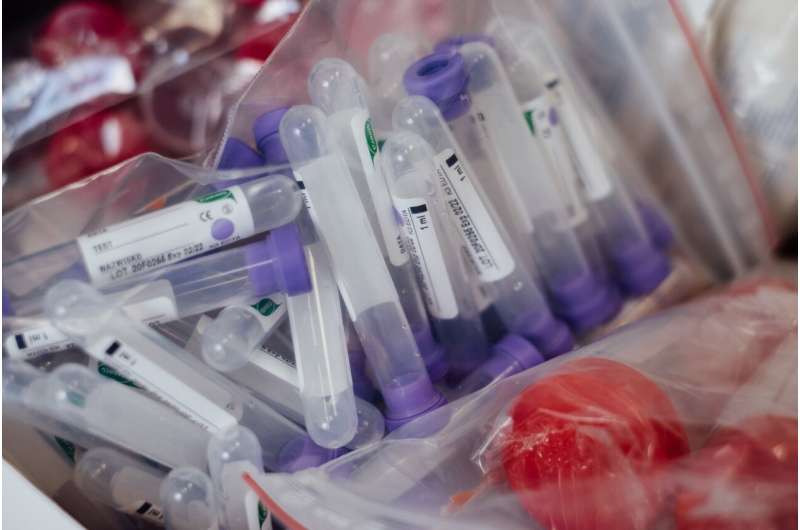Influenza vaccination may provide roadmap to prevent COVID-19 in cardiovascular disease patients

Seasonal influenza vaccine development and mass production, as well as three international influenza vaccine cardiovascular outcomes trials currently underway, may inform future efforts targeted at developing and evaluating vaccine strategies for COVID-19, according to a state-of-the-art review in the Journal of the American College of Cardiology. Authors of the paper also evaluated whether existing flu trial networks could offer primary and secondary prevention strategies for patients with cardiovascular disease at risk of complications from COVID-19.
The World Health Organization estimates that influenza kills as many as 650,000 people every year globally, citing influenza as a top 10 leading cause of death among people of all ages, especially those with one or more comorbidities like cardiovascular disease. Furthermore, seasonal influenza epidemics have been associated with population-level increases in cardiovascular hospitalization and mortality. For these reasons, clinical guidelines recommend the general population receive their flu vaccination annually to reduce the risk of influenza-like illness, with high-risk individuals the most urged to get vaccinated.
In December 2019 in Wuhan, China, SARS-CoV-2, a novel coronavirus, emerged generating the widespread outbreak of coronavirus disease 2019 (COVID-19). By March 11, 2020, COVID-19 was declared a pandemic by the WHO, with an overall case fatality ratio of around 2.3%. Patients with COVID-19 who have or at risk of cardiovascular disease have an increased case fatality ratio, including 6% for hypertension, 7.3% for diabetes and 10.5% for cardiovascular disease.
Research has shown that viral respiratory infections such as seasonal influenza and COVID-19 are risk factors for cardiovascular disease. Patients with cardiovascular disease are also at a higher risk of complications following viral respiratory infections, including increased morbidity, mortality and health care utilization. Current data suggests influenza infection and the novel coronavirus share similar symptoms at the outset, primarily fever, cough and shortness of breath. However, COVID-19 appears to be more contagious than the flu.
"Although COVID-19 and other respiratory virus infections are associated with acute myocardial infarction and other cardiovascular events, influenza has the best evidence of a safe vaccine option for cardiovascular risk reduction to date," said Jacob A. Udell, MD, MPH, cardiologist at Women's College Hospital and Toronto General Hospital's Peter Munk Cardiac Centre, University of Toronto, and corresponding author of the paper. "Several observational and small, randomized studies have suggested that influenza vaccination may serve as a preventative measure against adverse cardiovascular outcomes. However, despite international guidelines recommending routine influenza and pneumococcal vaccination for patients with cardiovascular disease, uptake is substantially lacking and often deprioritized, including at the time of a cardiovascular hospitalization."
There are currently three international cardiovascular outcomes trials examining the cardioprotective effects of different influenza vaccine formulations. The Influenza Vaccine to Prevent Adverse Vascular Events trial is a placebo-controlled, randomized clinical trial studying adverse cardiovascular events using the New York Heart Association Functional Class II-IV HF in patients from Asia, the Middle East and Africa. The Influenza Vaccination After Myocardial Infarction trial is also a placebo-controlled, randomized clinical trial testing patients with an ST-elevation myocardial infarction (STEMI), or non-STEMI, or stable coronary artery disease (age ≥75 years) undergoing coronary angiography, with data being collected from Sweden, Denmark, Norway, Czech Republic, Scotland, Latvia, Australia and Bangladesh. A third clinical trial, funded by the NIH, is being conducted in the US and Canada, the INfluenza Vaccine to Effectively Stop cardioThoracic Events and Decompensated heart failure trial, which is the first study of its kind comparing two different types of influenza vaccines over several flu seasons, in high-risk cardiovascular patients with a recent history of myocardial infarction or hospitalization for heart failure.
"Three large ongoing influenza vaccine cardiovascular outcome trials have an opportunity to contribute further to our understanding of the underlying comorbidities in these patients that may be drivingmorbidity and mortality associated with COVID-19 infection," Udell said. "These cohorts may also be an opportunity to explore novel infection prevention therapies beyond influenza vaccination inpatients that have already volunteered to participate in a respiratory virus vaccine cardiovascular outcome study. While developing new vaccines, we will also definitively learn soon whether influenzavaccination is an effective, low-cost, widely available therapy that reduces cardiovascular risk, which may further help prevent fatal and nonfatal cardiovascular complications of COVID-19."
More information: Journal of the American College of Cardiology (2020). DOI: 10.1016/j.jacc.2020.08.028



















